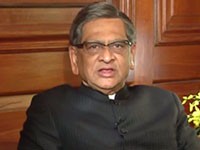New Delhi, April 28, 2010 (SANS Correspondent):
 The damning basics of Madhuri Gupta's story are the must-haves of any spy story. Which is what this is. For real.
The damning basics of Madhuri Gupta's story are the must-haves of any spy story. Which is what this is. For real. The 53-year-old was posted at the Islamabad High Commission. The Indian Foreign Services B-Cadre diplomat was the Second Secretary for Press and Information at the highly-sensitive Islamabad embassy. She allegedly fell in love with Rana, her Pakistani handler, and began selling secrets to him. Sources say that in her confession to the police, she said she also wanted revenge - she had been overlooked for promotion, and was unhappy with her service conditions. In other words, she did it for love and money. She was arrested in Delhi on Tuesday, after being summoned from Pakistan on the pretext that she was needed for the South Asian Association for Regional Cooperation (SAARC) meet, now underway in Thimphu.
Eight months ago, Gupta's colleagues at the mission became suspicious of her motives, and alerted her seniors. "We have reason to believe an official of the Indian High Commission in Islamabad had been passing info to Pakistan intelligence agencies. The matter is currently under investigation. The officer is cooperating with us," said Vishnu Prakash, a spokesperson for the Ministry of External Affairs.
Officials confirm that as a second secretary, Gupta's access to classified information may have been limited. Gupta, who was known for her proficiency in Urdu, is accused of having shared the identity of undercover Indian officers, and of sharing details of their assignments. To the Pakistanis who she worked for, however, she bragged that she had intimate access to the station chief of India's intelligence agency, the Research and Analysis Wing (RAW), in Islamabad. RAW has investigated emails she sent, but say much of the information she gave, quoting or citing the RAW chief, is incorrect. So far, RAW has no evidence against him.
When asked about Gupta's arrest, Pakistan Foreign Minister Shah Mahmood Qureshi, who is at the SAARC meet in Thimphu said, "My information is as good as yours because it is based on media reports."
Eight months ago, Gupta's colleagues at the mission became suspicious of her motives, and alerted her seniors. "We have reason to believe an official of the Indian High Commission in Islamabad had been passing info to Pakistan intelligence agencies. The matter is currently under investigation. The officer is cooperating with us," said Vishnu Prakash, a spokesperson for the Ministry of External Affairs.
Officials confirm that as a second secretary, Gupta's access to classified information may have been limited. Gupta, who was known for her proficiency in Urdu, is accused of having shared the identity of undercover Indian officers, and of sharing details of their assignments. To the Pakistanis who she worked for, however, she bragged that she had intimate access to the station chief of India's intelligence agency, the Research and Analysis Wing (RAW), in Islamabad. RAW has investigated emails she sent, but say much of the information she gave, quoting or citing the RAW chief, is incorrect. So far, RAW has no evidence against him.
When asked about Gupta's arrest, Pakistan Foreign Minister Shah Mahmood Qureshi, who is at the SAARC meet in Thimphu said, "My information is as good as yours because it is based on media reports."
Indian diplomat-turned-spy:
'Serious matter'- says Indian Foreign Minister
 The Indian government is trying to unravel why and how an Indian diplomat posted to Islamabad began selling secrets to Pakistan, says External Affairs Minister SM Krishna. Intelligence sources say that while Madhuri Gupta did not have access to crucial information, she outed several Indian undercover agents within the Indian High Commission to the Pakistanis she was in touch with. Speaking to NDTV, SM Krishna explained, "The investigations are going on...we will have to wait till the investigations are complete. And then you know, find out what was the motive, what was the modus operandi." The minister added that Gupta was recalled to Delhi because of "the seriousness of the issues involved."
The Indian government is trying to unravel why and how an Indian diplomat posted to Islamabad began selling secrets to Pakistan, says External Affairs Minister SM Krishna. Intelligence sources say that while Madhuri Gupta did not have access to crucial information, she outed several Indian undercover agents within the Indian High Commission to the Pakistanis she was in touch with. Speaking to NDTV, SM Krishna explained, "The investigations are going on...we will have to wait till the investigations are complete. And then you know, find out what was the motive, what was the modus operandi." The minister added that Gupta was recalled to Delhi because of "the seriousness of the issues involved."No access to key plans:
- She had no access to any sensitive documents or plans
- She may have been recruited by the Pakistanis during her Kuala Lumpur stint
- Her former colleagues recalled her keenness to be posted to Pakistan
- Revealed India's undercover operatives inside High Commission
- She passed on conversations with Indian staffers through email
When asked if he would bring this up with the Pakistani government, Krishna said, "Well, let us first get through with the investigation that we have initiated...the Home Ministry is doing it...then once we get a report on the investigations, then perhaps whatever there needs to be done, will be done by the Government of India."However, the government stresses that her position was too junior to allow her access to any critical information. She sent emails sharing conversations she overheard at the High Commission.
Gupta allegedly told the Pakistanis she was working with that she had access to information from the Islamabad chief of Indian intelligence agency, the Research and Analysis Wing (RAW). Emails from her, however, allegedly show that the facts she attributed to the RAW state chief were incorrect.
Mata Hari to Madhuri Gupta:
---------The league of women spies
Arrested IFS officer Madhuri Gupta may not be in the league of famous women spies Mata Hari and Virginia Hall, but the allegations that she was passing on sensitive information to ISI agents is a rude shock to the Indian establishment. India's external Intelligence agency Research and Analysis Wing (RAW), like any other snooping organisation of the world, has a history of agents who had switched their loyalties towards countries where they were working.
Mata Hari's name became synonymous with espionage and the Dutch dancer, whose real name was Gertrud Margarete Zelle, was executed by a French firing squad in 1917 on charges of being a spy. Virginia Hall was an American spy during the Second World War and the Gestapo (Nazi political police) considered her the most dangerous of all allied spies.
The most infamous case which shook RAW out of reverie was of Rabinder Singh who became a mole of American intelligence agency CIA and flew to the US despite being under RAW surveillance. Singh, who initially worked with the Indian Army, held a very senior position with RAW handling Southeast Asia. By the time the agency sensed his affiliations, Singh too smelled a rat and escaped to the US through Nepal. In 2007, RAW had to call back its 1975 batch officer Ravi Nair from Colombo because of his alleged "involvement" with a woman agent of Chinese intelligence acting as honey trap for him. According to reports, after the Rabinder Singh incident, Prime Minister Manmohan Singh had sought details of RAW officials who have either gone missing or changed their loyalties.
A list of about nine such officials was presented before him who deserted the organisation since it was formed in late 60s to serve Indian intelligence purposes. Official sources say a personal assistant to a very senior RAW official disappeared in London in the early 90s.
Ashok Sathe, another official was also believed to have defected to the US after his mysterious disappearance. Sathe was said to be behind burning down of RAW office in Khurramshahr, Iran. In the early 1980s a senior field officer disappeared in London. As attache in Kathmandu, he was alleged to be liaisoning with foreign intelligence agencies. (Edited by: Anwarul Karim Raju)
Mata Hari's name became synonymous with espionage and the Dutch dancer, whose real name was Gertrud Margarete Zelle, was executed by a French firing squad in 1917 on charges of being a spy. Virginia Hall was an American spy during the Second World War and the Gestapo (Nazi political police) considered her the most dangerous of all allied spies.
The most infamous case which shook RAW out of reverie was of Rabinder Singh who became a mole of American intelligence agency CIA and flew to the US despite being under RAW surveillance. Singh, who initially worked with the Indian Army, held a very senior position with RAW handling Southeast Asia. By the time the agency sensed his affiliations, Singh too smelled a rat and escaped to the US through Nepal. In 2007, RAW had to call back its 1975 batch officer Ravi Nair from Colombo because of his alleged "involvement" with a woman agent of Chinese intelligence acting as honey trap for him. According to reports, after the Rabinder Singh incident, Prime Minister Manmohan Singh had sought details of RAW officials who have either gone missing or changed their loyalties.
A list of about nine such officials was presented before him who deserted the organisation since it was formed in late 60s to serve Indian intelligence purposes. Official sources say a personal assistant to a very senior RAW official disappeared in London in the early 90s.
Ashok Sathe, another official was also believed to have defected to the US after his mysterious disappearance. Sathe was said to be behind burning down of RAW office in Khurramshahr, Iran. In the early 1980s a senior field officer disappeared in London. As attache in Kathmandu, he was alleged to be liaisoning with foreign intelligence agencies. (Edited by: Anwarul Karim Raju)
























